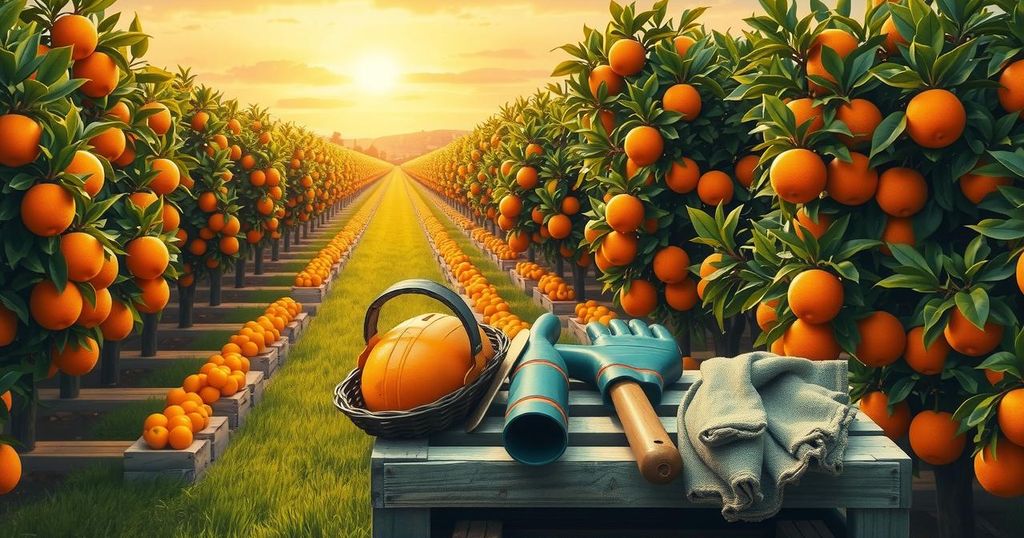South Africa’s citrus industry faces severe job risks if U.S. tariffs are imposed, as the upcoming AGOA renewal in September 2025 hangs in the balance. Local farmers and market experts express urgency in managing the risks linked to tariff-free access. The recent land expropriation legalities exacerbate tensions and fears among farmers, with many feeling neglected by their government amidst global attention brought by President Trump.
As tariffs loom under the Trump administration, South Africa’s citrus farming sector faces potential jeopardy, threatening tens of thousands of jobs. The U.S. is one of the primary markets for South African citrus, with the African Growth and Opportunity Act (AGOA) facilitating tariff-free exports. However, the upcoming AGOA renewal in September 2025 raises concerns, as President Trump has imposed tariffs on neighboring nations and could similarly impact South Africa.
Citrusdal, a picturesque community in the Western Cape, is home to expansive orchards bearing oranges and lemons. Market analysts are now urging local officials to proactively withdraw from AGOA before a potential U.S. tariff enforcement in September. Gerrit van der Merwe, chair of the Citrus Growers’ Association, emphasizes the devastating impact a loss of tariff-free access could inflict on both farmers and the broader community if South Africa does not act appropriately.
With citrus exports largely contributing to approximately 35,000 direct jobs and an additional 25,000 in the United States, the stakes are notably high. Despite only 9% of South African citrus being sent to the U.S., the complete cessation of tariff-free access could greatly hinder employment prospects in an already strained labor market, marked by a 35 to 45% unemployment rate.
The socio-political landscape further complicates these fiscal concerns. South Africa’s recent land expropriation legislation allows the government to confiscate land for public interest, a move that has provoked sharp criticism domestically and abroad. President Trump’s executive order labeling the legislation as “egregious and hateful” offers asylum to Afrikaners, although the practicality of this option is disputed by local farmers.
Gerrit van der Merwe notes that while some farmers express interest in U.S. asylum, the majority of citrus growers wish to remain in South Africa, feeling overshadowed by sensational media narratives. Wannie Scribante, a citrus farmer in another region, reinforces concerns about government honesty regarding land expropriation while highlighting his farm’s high-tech security measures to mitigate threats from squatters.
As tensions mount, many farmers feel abandoned by the South African government, leading to a hope that invitations for dialogue may emerge from international voices like President Trump. Overall, the potential economic fallout from U.S. tariffs, coupled with local land policy changes, presents a precarious future for South Africa’s citrus industry and its workforce.
The looming threat of U.S. tariffs poses a significant risk to South Africa’s thriving citrus industry, potentially affecting thousands of livelihoods amid an ongoing unemployment crisis. The ramifications of the AGOA renewal could significantly impact both local farmers and related U.S. jobs. Furthermore, underlying issues of land ownership and recent governmental policy changes continue to create a climate of uncertainty, entrenching fears within the agricultural community. As such, both local and international dialogues are paramount for fostering a sustainable resolution and preserving economic stability.
Original Source: news.sky.com




